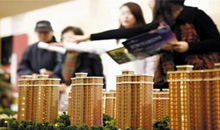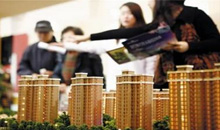China first quarter property investment growth weakens to near six-year low, sales drop narrows
Property investment growth eased to 8.5 percent in January to March from a year earlier, the National Bureau of Statistics (NBS) reported on Wednesday, dropping from 10.4 percent in the first two months of 2015. The 2009 low was 8.3 percent.

HONG KONG (Reuters) - Growth in China's real estate investment in the first quarter slowed to the lowest rate since 2009 as developers focused on clearing excess inventory, while a series of government support measures braked the rate of decline in property sales.
Property investment growth eased to 8.5 percent in January to March from a year earlier, the National Bureau of Statistics (NBS) reported on Wednesday, dropping from 10.4 percent in the first two months of 2015. The 2009 low was 8.3 percent.
Property sales volume dropped 9.2 percent from the year-earlier period, narrowing from a 16.3 percent decline in January to February.
Growth in China's gross domestic product, of which real estate comprises about 15 percent, slowed to a six-year low of 7.0 percent in the first quarter as demand stayed weak.
GDP data out on Wednesday met analyst forecasts, but built up expectations that authorities will roll out more policy stimulus to avert a sharper slowdown.
China's stock indexes, which have been on a historic rally since Beijing began easing monetary policy in November, eased in afternoon trade after the data release, with the CSI300 index <.CSI300> down 0.8 percent. The CSI300 real estate sub-index <.CSI300REI>, however, dipped over 2 percent.
"The easing policies will be of limited help to property investment, which has a larger impact on the real economy than housing sales. It'll be difficult for property investment to see a rise in growth," said Nomura chief China economist Zhao Yang. "That's why the government is focusing on boosting infrastructure."
Zhao said the government's relaxation of its house-buying regulations in late March were stimulatory to sales in the short term, and forecast some slight growth for the second half of the year.
The real estate downturn remains a key risk to China's 7 percent economic growth target, crimping demand in 40 related economic sectors ranging from steel to cement to furniture.
China Vanke <2202.HK> <000002.SZ>, the country's largest property developer, last month warned of a large inventory of unsold property, and state-backed China Resources Land <1109.HK> said the sector will continue to focus on clearing inventory this year.
But the rate of decline in Chinese home prices slowed in March from February, two private surveys showed, adding to hopes the housing market is stabilizing as Beijing enacts policies to bolster a faltering economy.





 沪公网安备31010402003309号
沪公网安备31010402003309号



